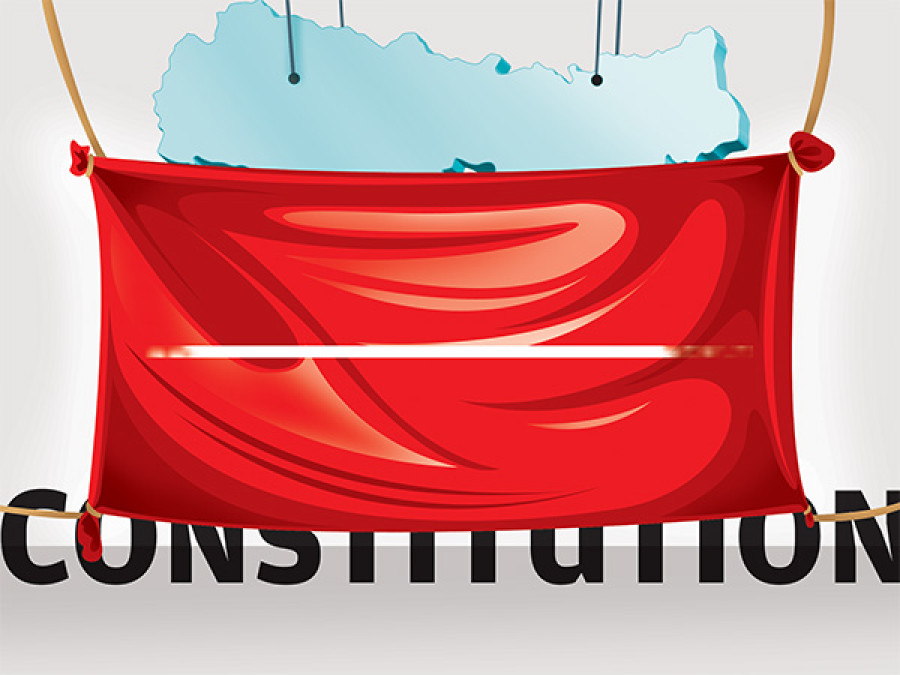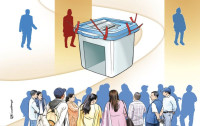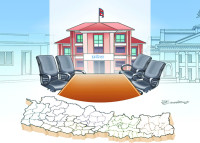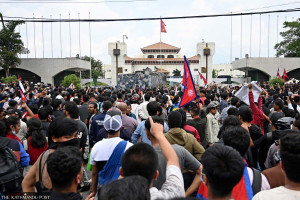Opinion
By all, for all
NC-UML’s rhetoric sends the message that the constitution is being written only for the ruling parties.
Prakash Bom
If this happens, a constitution will be a procedurally incomplete legislation. Such a statute may not be able to guarantee political stability or establish longlasting peace for economic prosperity. No matter what power the ruling parties have to prevent such an adversity, it cannot be the means to a democratic end.
Still seeking consensus
The ball, therefore, is in the court of the ruling parties, particularly in the hands of the senior leaders who have dominated statute-drafting with their rhetoric of two-thirds majority. In truth, no one is arguing that majority rule is not democratic, but in CA proceedings, the opposition must be included, whether they support or oppose or leave by registering a note of dissent. That is why the international community is approaching the government for maximum consensus, as they are concerned about their own contributions and support to the CA process, not to mention the UN’s role since the signing of the Comprehensive Peace Agreement (CPA) in 2006.
Statistically, promulgating the constitution through a two-thirds majority might be acceptable to 4.2 million voters. But it may not work for all 9.6 million Nepalis who cast their ballot in November 2013. Therefore, the ruling coalition should be concerned about bringing in more parties to the legislatorial proceedings of the CA. Instead, their bill to amend the CA regulation to form the Questionnaire Committee to kickstart constitution drafting proceedings compelled the opposition to boycott Assembly meetings altogether. If the Committee fails to respect the decrees of the Interim Constitution, then it will dishonour the CPA, the 12-point agreement, and dismantle the overall achievements of Janaandolan-II.
If the Questionnaire Committee’s list of questions goes against popular sentiments and the Interim Constitution, then the power of two-thirds politics of the ruling parties will backfire and could further fail to woo the opposition. However, if the ruling parties did indeed form the Questionnaire Committee with the intention of honouring the decrees of the Interim Constitution, then it might help dispel the opposition’s doubts and initiate dialogue on contentious issues.
Nearing agreement
If the contentious issue of a directly-elected executive head of the federal government, even under the parliamentary system—which the young generation of all political parties long desire for stability in government—had been agreed upon by the senior leaders of the ruling parties, the UCPN (Maoist) could have made a breakthrough deal. So there’s still a chance.
Similarly, with regards to the election system, if a proportional election system is fully managed by the Election Commission as per its norms (not as per practice in both CA elections with the interference of the political parties), it would be more scientific, economic, and inclusive than the first-past-the-post system. Therefore, in order to draw the attention of the opposition to legislatorial proceedings, the ruling parties must increase the percentage of proportional seats.
On judiciary, it would be very difficult for the Supreme Court to resolve unprecedented federal issues without the formation of a special temporary court system, such as the proposed Constitutional Court. It would be nothing more than daydreaming if senior leaders are still thinking of continuing with the current court system under the federal setup, because the independence of the judiciary is a must under federalism. Independent judicial commissions, like the Public Service Commission for employment at the courts without political interference, could be the best option for establishing the independence of the judiciary.
With regard to the number of states, this should not have been a big deal as long as states have their rights fully reserved in the constitution, such as the right to self-determination and the right to autonomy. Thus, all states will have equal rights and a particular state need not be declared as an autonomous region under federalism. The Tarai, therefore, cannot have one autonomous region geographically, linguistically, or culturally.
Megalomania
Nonetheless, the current state of affairs, which shows preference for a two-thirds majority over consensus, sends a message to the public that the constitution is being written only for the ruling parties. The constitution should be the law of the land written for all to honour. However, since the senior leaders of the major political parties have failed to come to a meeting point to transform the nation beyond their own political interests, they are making themselves look like megalomaniacs to the common people. January 22 was not the end of the world. Since the senior leaders have not yet taken responsibility, can young leaders instead get a chance?
Bom is a freelance writer at Global Politician, an independent journal of politics and world affairs




 5.56°C Kathmandu
5.56°C Kathmandu












